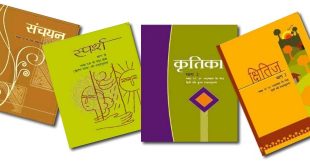9th English Periodic Test II (2018-19)
Time: 3 hour
M.M.: 80 marks
Date: 16/09/2018
Class: IX
General Instructions:
- Section A: Reading – 20 marks
- Section B: Writing and Grammar – 30 marks
- Section C: Literature – 30 marks
SECTION – A: (Reading 20 marks)
Question: 1. Read the passage given below and answer the questions: (12 marks)
- Politeness has been defined as benevolence in trifles. It is the desire to put those whom we meet perfectly at their ease, and save them from every kind of petty discomfort and annoyance. The limited part of benevolence called politeness requires only an inclination to make them happy temporarily, while they are in our presence, and when this can be done without any sacrifice on our part or with a slight sacrifice of personal comfort.
- Politeness is said to be one of the important characteristics of civilized person. Politeness is the art of choosing among your thoughts. It must be implemented in every walk of life. When we deal with people elder to us we are polite. But, an honest polite person is polite with everyone, people of lower status, workers and even children. Not only with humans but also with animals we must be polite as they are our helpers.
- Politeness is a skill. Like any other skill, you can master it with practice. The greatest enemy of politeness is ego. To be a polite person, you have to sacrifice your sacrifice your ego. It is difficult for an egoist to be polite. You have to imply politeness in your thinking, speech and actions. Actions work more than words. Polite actions will give fine results. Politeness will reduce your stress and boost you to be productive. Apart from your present benefits, you protect your future. Being polite makes you mentally healthy. In our daily life we come across many incidents with people nearby and ourselves.
- Different rules of behavior have to be observed, accordingly as we are in the street or in the drawing room, at school, in the company of friends or of strangers. There is also to be considered the great diversity of social etiquette which distinguishes one country from another.
- Politeness, besides being a duty that we owe to others, is a valuable possession for ourselves. It costs nothing, and yet may in many cases by Dr. Johnson, when he said that the difference between a well – bred and an ill – bred man is that one immediately attracts your liking, the other your dislike.
A. On the basis of your reading the passage, answer the following:
- Why is politeness called the limited part of the benevolence? (2 marks)
- List come of the persons we should be polite to. (2 marks)
- Why is it difficult for an egoist to be polite? (2 marks)
- Which rules of behavior are to be observed? (2 marks)
B. On the basis of reading the passage fill in the blanks with appropriate phrases.
- Politeness is an art of choosing _______________. (1 marks)
- To others, we ________________. (1 marks)
C. Find out words that mean the same as:
- insignificant (para-1) (1 marks)
- civil (para-5) (1 marks)
Question: 2. Read the passage carefully: (8 marks)
- A Norwegian Mathematician Vejomo – Johansson of the KTH Royal Institute of Stockholm, Sweden developed an interest in a unique concept-the technique of knotting a tie and recorded 17, 147 of doing so. It is curiosity on the subject increased after viewing a video on You Tube by a film celebrity, on the technique of knotting a tie adopted by the characters in Matrix film series and in Merovingian series.
- To gain further knowledge in the subject, his research led him to the earlier findings of 85 techniques that were recorded at the University of Cambridge, by the experts Young Mao and Thomas Fink. They had not considered the fancy styles in their study which accounted for the poor count.
- They had considered only the normal, traditional and conventional ways of knotting a tie and had used ordinary everyday language to define their works. Johansson discovered that this common methodology was not used in the Matrix series, that involved several tucks, many folds and edges. He eventually set about rewriting the process by including numerous expressions that explained more elaborately different ways of knotting a tie.
- Subsequently, tie wearers have been provided with a variety with a variety of options to choose from to complete their office attire.
A. Answer the following questions briefly: (1×8 = 8 marks)
- What is the researcher referring to? (1 marks)
- To which faculty does the researcher belong and what is name? (1 marks)
- Who were the researchers, from Cambridge? (1 marks)
- Mention the drawbacks of their research. (1 marks)
- What inspired Johansson to do research? (1 marks)
- What special technique was used in Matrix series? (1 marks)
- Identify the words that means special and unusual (para – 1). (1 marks)
- Identify the word that means to describe in detailed manner’ from para-3. (1 marks)
Section – B: Writing and Grammar – 30 marks
Question: 3. Complete the story in about 200 – 250 words (10 marks)
Amit is a class X student. His exams are round the corner but he is feeling depressed and disturbed as his brother has been hospitalised. Develop a story using the following hints.
Disturbed – accident – hospital – could not study – pressure from parents and teacher – guidance given by uncle – relieved – a great stress buster – hard work – started afresh – passed with flying colours.
Question: 4. You are worried that in-spite of so many awareness programmes, today’s generation is still not taking the harmful effects seriously.
Write a suitable article in about 100-120 words on the topic ‘The battle to ban plastic’ (8 marks)
Or
You participated in an inter-house drama competition and your play was adjudged the best. All participants were given trophies and you were overjoyed on receiving yours. Later you felt like expressing your happiness in the form of a diary entry. (4 marks)
Question: 5. Complete the sentences given below with help of options that follow: (4 marks)
About half of India’s children aged (i) _______ 6 and 14 do not go to school. About 5.5 crore children (ii) ________ in factories, cottage industries (iii) _______ in the agricultural sector. One of the most important (iv) _______ for our nation’s backwardness is illiteracy.
(i) (a) about (b) among (c) between
(ii) (a) worked (b) working (c) work
(iii) (a) and (b) around (c) some
(iv) (a) reason (b) reasons (c) reason’s
Question: 6. There is error in each line. Write the error and the corrections in the answer sheet as given below: (4 marks)
Question: 7. Rearrange the following words to form meaningful sentences. Write your answers in your answer sheet in correct order. (4 marks)
- observe / is / traffic / to / it / rules / important. (1 marks)
- not / children / below / of / the / age / must / years / drive / eighteen (1 marks)
- protection / our / we / must / helmets / own / wear / for (1 marks)
- phones / must / used / not / mobile / be / driving / while (1 marks)
Section C: Literature – 30 marks
Question: 8. Read the extracts given below and answer the questions that follow: (any one) (1×4 = 4 marks)
I will arise and go to Innisfree
And a small cabin there build there, of clay and wattles made
Nine bean rows will I have there, a hive for the honeybee.
And live alone in the bee-loud glade.
- What kind of place is Innisfree? (1 marks)
- What does he wish to do there? (1 marks)
- Why does he say ‘I will arise and go now’? (1 marks)
- Trace a word from the extract which is the antonym of ‘slumber’ (1 marks)
Or
“Now in memory comes my mother,
As she used in years agone,
To regard the darling dreamers
Ere she left them till the dawn:
O! I feel her fond look on me
As I list to this refrain
Which is played upon the shingles
By the patter of the rain.
- What is the memory that comes to the poet? (1 marks)
- Trace a word from the extract that means “rectangular wooden tiles”. (1 marks)
- Name the poetic device used in the third line. (1 marks)
- What does the poet imply “the darling dreamers”?(1 marks)
Question: 9. Answer: the following questions. (Any 5) (2×5 = 10 marks)
- Why couldn’t St. Peter tolerate ‘such a woman’?
- Why does the world remember Einstein as a “world citizen”?
- What important lesson did the narrator learn from the snake?
- Write a short note on Evelyn’s passion for music.
- Why did the swallow decide to stay with the Happy Prince?
- What changes did the king and his ministers bring about in the Kingdom of Fools?
Question: 10. Answer anyone of the following in about 100-150 words. (8 marks)
kezia’s father was actually different from what he appeared to kezia. justify.
Or
‘The Road Not Taken’ deals with a very important aspect of choice to be cultivated by all, through a very common aspect of human behavior. Describe how is, choice important in making life a successful experience.
Question: 11. Answer any one of the following in about 100-150 words. (8 marks)
List all the people who were helped by the Prince and swallow and what problems of the people were solved in each case?
Or
How was Toto an expensive deal for grandfather? Do you think it was a lesson for grandfather?
 Class Notes NCERT Solutions for CBSE Students
Class Notes NCERT Solutions for CBSE Students





